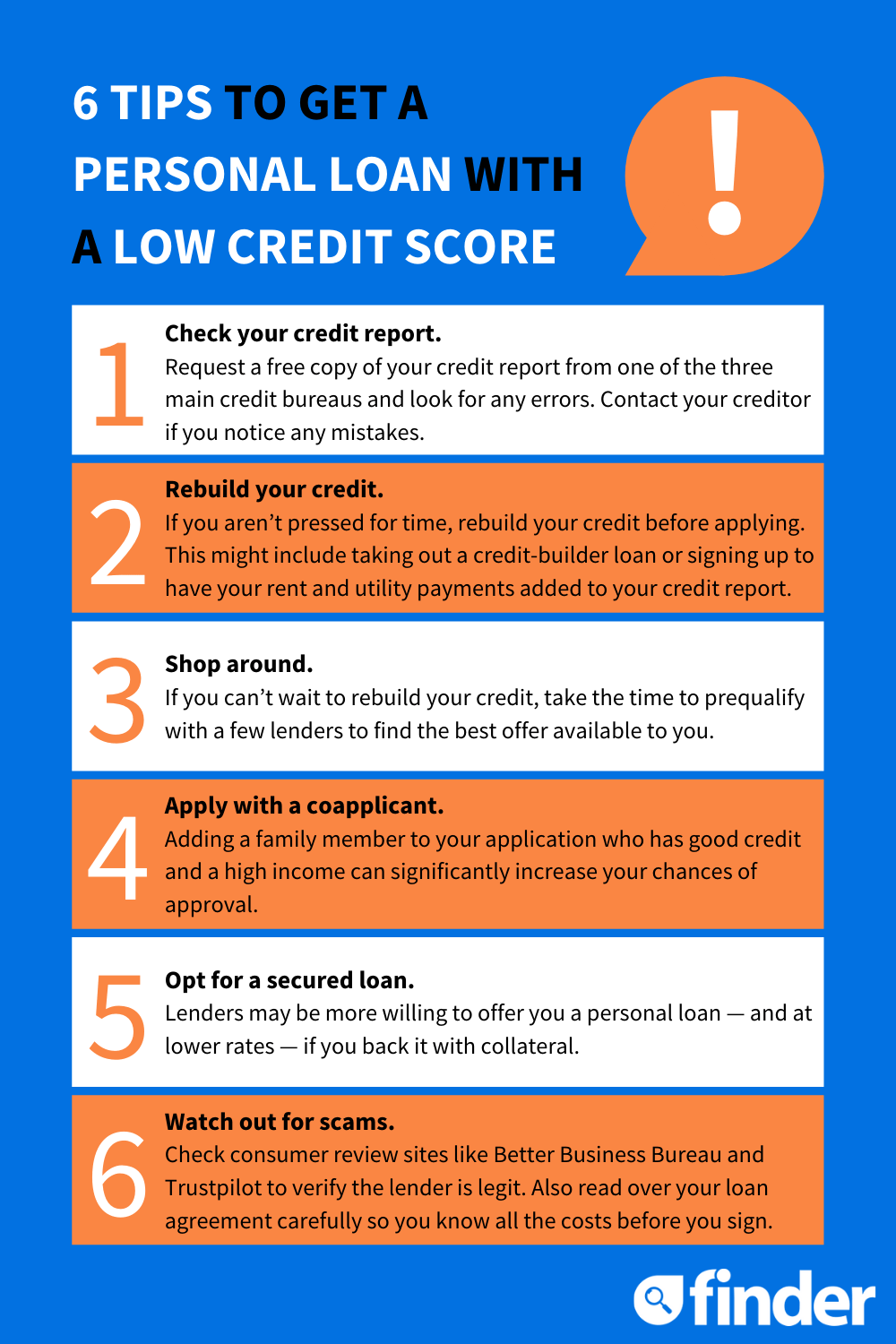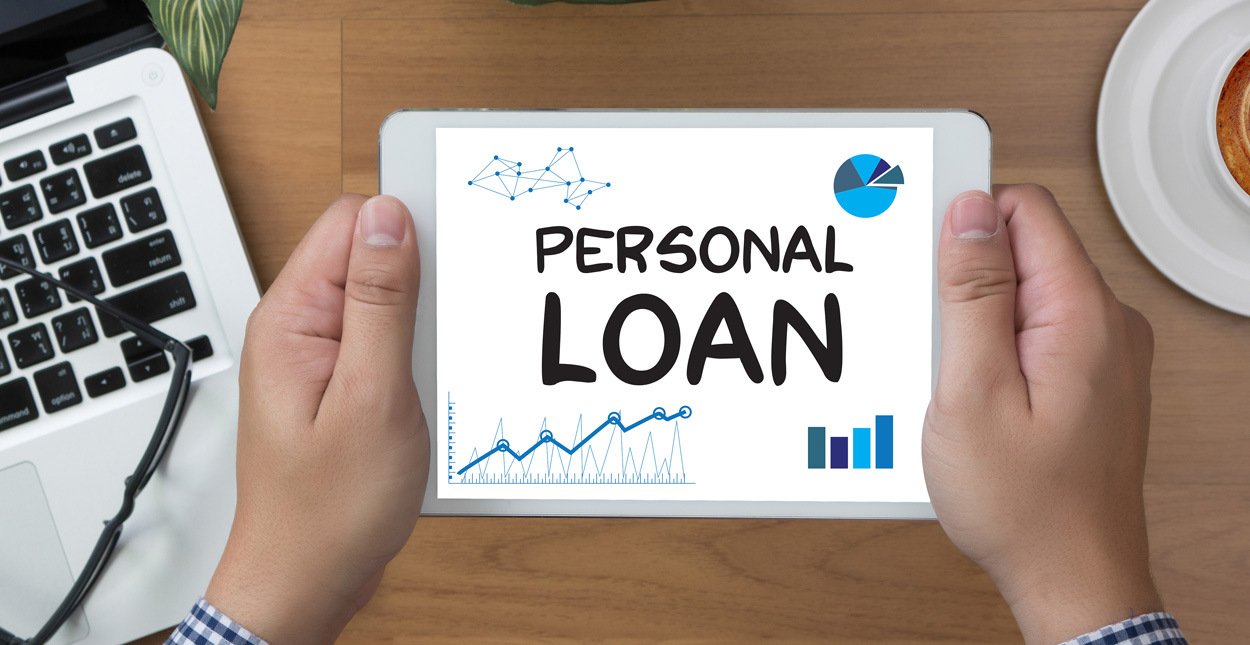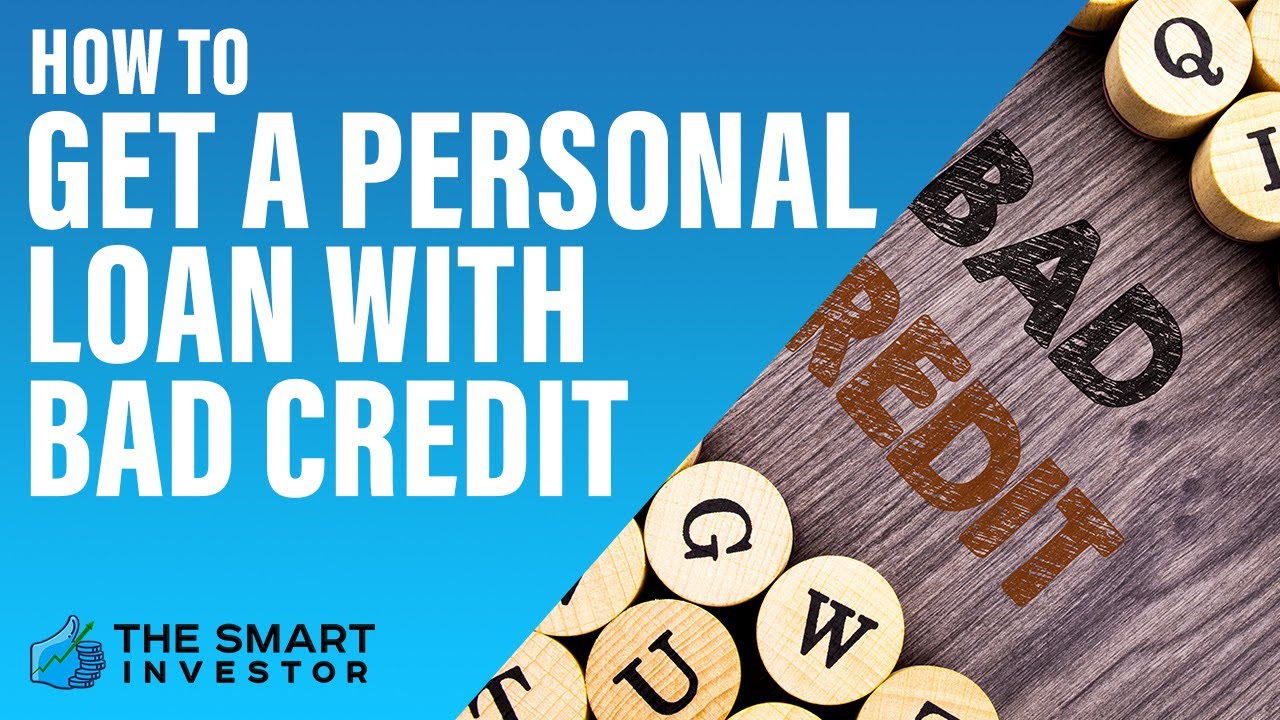So, you’ve found yourself in a bit of a financial pickle and your credit score isn’t exactly in top-notch shape. Don’t fret – we’ve got your back! In this article, we’ll provide you with some handy tips to help you secure personal loans, even with bad credit. Whether you’re looking to consolidate your debts, tackle unexpected expenses, or simply in need of some extra cash, read on to discover how you can navigate the world of personal loans with confidence, regardless of your credit score. Get ready to turn your financial situation around and secure the funds you need!

This image is property of www.finder.com.
Understanding Personal Loans
Personal loans are a type of borrowing that individuals can use for a variety of purposes, such as financing a large purchase, consolidating debts, or covering unexpected expenses. Unlike other types of loans, personal loans are unsecured, meaning they don’t require collateral. This makes personal loans attractive to many borrowers who may not have valuable assets to use as security.
How do personal loans work?
When you apply for a personal loan, the lender will evaluate your creditworthiness and financial situation to determine whether to approve your application. If approved, you will receive a lump sum of money, which you will need to repay over a fixed term. Personal loans typically have fixed interest rates and monthly payments, making them predictable and easier to budget for.
Why do people with bad credit struggle to get personal loans?
People with bad credit often face challenges when seeking personal loans. Bad credit is typically defined as having a low credit score, a history of missed payments, or a high debt-to-income ratio. Lenders view borrowers with bad credit as higher risk, making them less likely to approve their loan applications. If approved, borrowers with bad credit may be offered higher interest rates or less favorable terms.
Assessing Your Financial Situation
Before applying for a personal loan, it’s essential to assess your financial situation thoroughly. This evaluation will help you determine whether you are ready to take on the responsibility of a loan and improve your chances of getting approved.
Evaluate your credit score
Obtain a copy of your credit report and review it carefully. Your credit score will be a significant factor in the lender’s decision-making process. Look for any errors or discrepancies that could be affecting your score and take steps to correct them.
Calculate your debt-to-income ratio
Your debt-to-income (DTI) ratio is a measure of your monthly debt payments compared to your monthly income. A high DTI ratio can indicate that you are already burdened with debt and may struggle to repay a new loan. Calculate your DTI ratio by dividing your total monthly debt payments by your gross monthly income, then multiply by 100 to express it as a percentage.
Determine your repayment capacity
Assess your current income and expenses to determine how much you can comfortably afford to repay each month. Consider your existing debts, living expenses, and any other financial commitments. It’s important to be realistic about what you can afford to avoid getting into further financial trouble.

This image is property of www.badcredit.org.
Improving Your Credit Score
Improving your credit score can significantly increase your chances of getting approved for a personal loan and securing more favorable terms. Here are some steps you can take to improve your credit score:
Review your credit report
Thoroughly review your credit report to identify any errors, outdated information, or fraudulent activities. Dispute any inaccuracies with the credit bureaus and provide supporting documentation to have them corrected.
Identify and dispute errors
Even small errors on your credit report can have a negative impact on your credit score. If you find any errors or discrepancies, make sure to dispute them with the credit bureaus and provide supporting documentation. Correcting these errors can lead to an increase in your credit score.
Pay off outstanding debts
Reducing your existing debts can positively impact your credit score. Focus on paying off high-interest debts first, such as credit cards or personal loans. Making consistent and timely payments will demonstrate your financial responsibility and improve your creditworthiness.
Establish a good payment history
Consistently making on-time payments is crucial in building a good credit history. Pay all your bills, loans, and credit card payments on time to demonstrate your reliability as a borrower. Over time, this will have a positive impact on your credit score.
Keep credit utilization low
Keep your credit card balances low and avoid reaching your credit limit. High credit utilization can negatively impact your credit score. Aim to keep your credit utilization below 30% of your available credit to demonstrate responsible credit management.
Exploring Loan Options
When you have bad credit, it’s important to explore different loan options to find the best fit for your needs. Here are some steps to consider:
Research different lenders
Not all lenders have the same criteria for approval, especially when it comes to borrowers with bad credit. Research various lenders, including traditional banks, credit unions, online lenders, and specialized bad credit lenders. Each may have different requirements and offer different terms.
Compare interest rates and fees
Interest rates and fees can vary significantly among lenders. It’s essential to compare the rates and fees offered by different lenders to find the most affordable option. Keep in mind that lenders may charge higher interest rates for borrowers with bad credit.
Consider secured vs. unsecured loans
Secured loans require collateral, such as a car or property, to secure the loan. If you have valuable assets, consider a secured loan as it may increase your chances of approval and possibly result in lower interest rates. However, keep in mind that failing to repay a secured loan could result in the loss of your collateral.
Look for specialized bad credit lenders
Some lenders specialize in working with borrowers who have bad credit. These lenders understand the challenges faced by borrowers with poor credit history and may offer more flexible terms or higher approval rates. However, be cautious of predatory lenders who may take advantage of your situation with excessively high-interest rates and fees.

This image is property of financer.com.
Preparing a Strong Loan Application
To increase your chances of getting approved for a personal loan, it’s important to prepare a strong loan application. Here are some steps to take:
Gather necessary documentation
Lenders will require specific documentation to evaluate your loan application, such as proof of income, identification, and bank statements. Gather all the necessary documentation in advance to streamline the application process and show the lender that you are prepared and organized.
Provide collateral or a cosigner if possible
If you have valuable assets or a trusted individual with good credit willing to act as a cosigner, consider offering collateral or having a cosigner on your loan application. This can provide additional security for the lender and increase your chances of approval.
Prepare a convincing loan proposal
When applying for a personal loan, it can be helpful to provide a convincing loan proposal that outlines how you intend to use the loan funds, your repayment plan, and any steps you have taken to improve your credit. This demonstrates your readiness and commitment to responsible borrowing.
Explain the actions taken to improve credit
If you have been working on improving your credit score, make sure to communicate this to the lender. Explain the steps you have taken to correct errors, pay off debts, and establish a positive payment history. This can help counteract your bad credit history and show your dedication to financial responsibility.
Seeking Alternative Financing Options
If traditional lenders are hesitant to approve your loan application due to bad credit, there are alternative financing options to consider:
Explore credit unions
Credit unions are member-owned financial institutions that may be more lenient in their lending criteria compared to traditional banks. They often offer competitive interest rates and lower fees, making them a viable alternative for borrowers with bad credit.
Consider peer-to-peer lending
Peer-to-peer lending platforms connect borrowers directly with individual investors willing to fund loans. These platforms may provide more flexible lending options for borrowers with bad credit. However, interest rates may be higher, so it’s essential to compare the rates and fees before proceeding.
Look into online lenders
Online lenders often have more lenient eligibility requirements and offer quick application processes. They may be more willing to work with borrowers with bad credit, although interest rates may be higher. Make sure to research the lender’s credibility and read reviews before proceeding.
Investigate payday loan alternatives
Payday loans should be a last resort due to their extremely high-interest rates and short repayment terms. Instead, consider alternatives such as installment loans or short-term personal loans, which may offer more reasonable terms and repayment schedules.
Ask friends or family for a loan
If you have a trustworthy friend or family member with the means to lend you money, consider discussing your situation with them. Formalize the agreement with a written contract outlining loan terms, repayment schedules, and any interest to avoid misunderstandings.

This image is property of i.ytimg.com.
Avoiding Predatory Lenders
When dealing with bad credit, it’s important to be cautious of predatory lenders who may take advantage of your vulnerable financial situation. Here’s how to protect yourself:
Beware of high-interest rates and fees
Predatory lenders often charge exorbitant interest rates and fees, making it difficult for borrowers to repay their loans. Be cautious of lenders offering significantly higher rates than the market average or imposing excessive fees.
Watch out for upfront fees or requests for payment
Reputable lenders typically deduct any fees from the loan amount disbursed, rather than requiring upfront payment. Avoid lenders asking for payment before approving or disbursing the loan, as this is a common red flag for scams.
Research lender credibility and reviews
Before committing to a loan, research the lender’s credibility and reputation. Look for reviews or complaints about the lender’s practices and customer experiences. Avoid lenders with a history of predatory or unethical behavior.
Read loan terms and agreements carefully
Always read the loan agreement thoroughly before signing. Pay close attention to interest rates, fees, repayment schedules, and any penalties for late or missed payments. If something is unclear or seems unfair, seek clarification from the lender or consider seeking advice from a professional.
Building a Solid Financial Plan
Getting a personal loan with bad credit is just one part of improving your financial situation. To ensure long-term success and avoid future financial troubles, it’s important to build a solid financial plan. Here are some steps to consider:
Create a budget
Developing a budget is crucial in managing your finances effectively. Track your income and expenses to ensure you are living within your means and have a clear understanding of where your money is going. Adjust your spending habits accordingly to prioritize debt repayment and savings.
Manage your debts effectively
Create a repayment plan to tackle your existing debts systematically. Prioritize high-interest debts first and consider debt consolidation if it can help simplify your repayment process. Avoid accumulating more debt by restraining unnecessary spending and focusing on responsible financial habits.
Save for emergencies
Building an emergency fund is essential to avoid falling into financial hardship in the future. Aim to save at least three to six months’ worth of living expenses in a separate, easily accessible account. This financial cushion will help you handle unexpected expenses without relying on high-interest loans or increasing your debts.
Establish a good payment history
Continue making on-time payments on all your debts and bills to establish a positive payment history. This will help rebuild your credit and open doors to better financing options in the future. Automating payments or setting reminders can assist in ensuring timely payments.

This image is property of s28126.pcdn.co.
Keeping a Long-Term Perspective
As you work on improving your credit and obtaining a personal loan, it’s important to keep a long-term perspective on your financial journey. Here are some key considerations:
Work on improving credit over time
Improving your credit score takes time and consistent effort. Focus on practicing responsible financial habits, such as paying bills on time, keeping credit utilization low, and reducing debts. Over time, your credit score will gradually improve, providing you with more favorable loan options.
Avoid unnecessary loans
While personal loans can be helpful in certain situations, it’s crucial to avoid unnecessary borrowing. Assess whether taking on additional debt is essential and consider alternative solutions, such as budgeting, saving, or seeking additional sources of income.
Focus on sustainable financial habits
Creating sustainable financial habits is key to staying on track with your financial goals. This includes budgeting effectively, managing debts responsibly, prioritizing saving, and making informed financial decisions. Take a holistic approach to your finances to ensure long-term financial stability.
Seeking Professional Advice
If you feel overwhelmed or uncertain about navigating the personal loan process with bad credit, consider seeking professional advice. Here are two options to explore:
Consult a credit counselor
Credit counselors can provide guidance and create a personalized plan to help you improve your credit and manage your debts. They can help you understand your options, negotiate with creditors, and develop a realistic repayment plan.
Discuss loan options with a financial advisor
A financial advisor can offer valuable insights and help you make informed decisions regarding personal loans and your overall financial situation. They can assess your specific circumstances, evaluate loan options, and provide tailored advice to meet your needs.
Remember, while personal loans can be a useful tool for improving your financial situation, they should be used responsibly and as part of a comprehensive financial plan. By taking steps to improve your credit, exploring various loan options, and seeking professional advice when needed, you can increase your chances of getting a personal loan with bad credit and move towards a healthier financial future.
